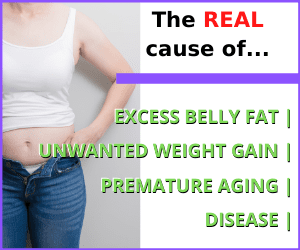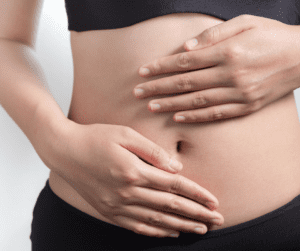If you're experiencing menopausal symptoms and have found that your weight is not budging, even with a healthy diet and regular exercise, there's a good chance the two are related. Weight gain during menopause is common, but there are ways to combat it. Keep reading to learn more.
 1. You're eating too many sweets
1. You're eating too many sweets
Many women turn to sugary snacks like chocolate and ice cream when they're feeling blue. (Mood swings are common during perimenopause, the years leading up to menopause.) While these foods may make you feel better in the moment, it's best to avoid them; research shows that sugar may lead to insulin resistance—a condition that prevents your body from responding properly to the hormone insulin (it becomes less effective at breaking down blood glucose). When your body can't use glucose for fuel, it turns to fat storage. If this sounds like you, try cutting back on junk food and opt for healthier snacks instead.
 2. You're stressed out
2. You're stressed out
When you're stressed out, your body releases the hormone cortisol. Chronic stress can make you feel perpetually on edge, increasing your cravings for high-fat and high-sugar foods (they provide a short-term energy boost). Try to manage stress more effectively by exercising regularly, meditating, or simply turning off your phone while you eat dinner.
3. You're drinking too much caffeine
A daily coffee habit may be fine while you're perimenopausal (it's okay to indulge in moderation—about 200 milligrams of caffeine a day), but don't overdo it once you hit menopause. Limit yourself to two cups a day—any more than that could cause problems with insomnia and weight gain, thanks to an increase in cortisol production. If you're giving up coffee entirely, try green tea instead—it's rich in antioxidants.
 4. Your ovaries aren't working as efficiently as they used to
4. Your ovaries aren't working as efficiently as they used to
Age plays a role in how effective the ovaries are at releasing eggs. When women hit their 40s and 50s (when many experience menopause), the number of viable eggs they produce decreases significantly; this means that they may need more time between pregnancies than they did when they were younger. Because of this change, it often takes longer for women who are closer to or past menopause to become pregnant naturally; fertility treatments such as Clomid (a drug that stimulates the development of ovarian follicles) can help women achieve pregnancy faster. Of course, your doctor may have a different explanation for your weight gain. Do you find that you put on a few pounds around the same time every year? You could be entering perimenopause—the years leading up to menopause when estrogen levels begin to fluctuate. If you suspect that's what's happening to you, it's time to see your doctor about hormone replacement therapy (HRT). HRT will help regulate estrogen levels and ease symptoms like hot flashes; it can also lower your risk of osteoporosis and heart disease, as well as prevent vaginal dryness, one of the most uncomfortable side effects of menopause. Just make sure not to take HRT unless you need it— has shown that postmenopausal women who use hormone replacement therapy are more likely to develop breast cancer than those who don't. (For now, stick to low-dose forms of estrogen-like bioidentical progesterone.)
5. You've gone through the change
If you're postmenopausal—meaning that you haven't had a period for at least 12 consecutive months—chances are you're not ovulating on your own anymore. Because ovulation is what fuels the production of estrogen, this could be why your body seems to have stopped shedding pounds as easily as it used to do. Keep in mind that there's no “normal” weight for postmenopausal women; everyone's body composition changes after menopause, so maintaining your old weight will probably prove difficult. Raising your metabolic rate with regular exercise and dropping excess pounds with diet and exercise will help you feel better about yourself, but don't expect to ever be as thin as you were before menopause.
 6. You're not getting enough sleep
6. You're not getting enough sleep
When you skimp on shut-eye, levels of leptin (a hormone that controls appetite) drop and levels of ghrelin (a hormone that signals hunger) rise; this can make it tough for you to lose weight around the middle (this type of weight gain is most likely to occur during perimenopause). And let's face it: Tossing and turning all night prevents most women from actually sleeping until they have to—which is usually when their alarm goes off.
7. You're not eating enough fiber
A low-fiber diet can wreak havoc on your digestive system, causing problems like constipation and irritable bowel syndrome; these conditions prompt the body to absorb water from waste products, which makes you feel bloated (and could certainly contribute to weight gain). Aim for at least 25 grams of fiber a day—you'll be able to fit more filling foods into your diet without worrying about calories. Try adding beans to salads or stir-fries, snacking on fruit with high-fiber cereal, or aiming for three whole-grain rice cakes topped with 1 tablespoon peanut butter.



 1. You're eating too many sweets
1. You're eating too many sweets 2. You're stressed out
2. You're stressed out 4. Your ovaries aren't working as efficiently as they used to
4. Your ovaries aren't working as efficiently as they used to 6. You're not getting enough sleep
6. You're not getting enough sleep
Would a solution be to add ostrogen medically to be able to feel better and loose weight until this awful time in womens life is over?
I wonder if this could be the cause for my irritability and feeling like I just hate everyone?
I totally believe this! Thankyou
I absolutely know this is true! I bottomed out in estrogen (blood tests) and no weight loss in 2 years! Just storing fat. Everyone thinks its cheeseburgers milkshakes and fries..which is not true. I eat Medeteranian diet plan. Ive tried keto..Shibboleth ..weight watchers..nothing works. I also drink lots of water and do average 10,000 to 15,000 steps per day.